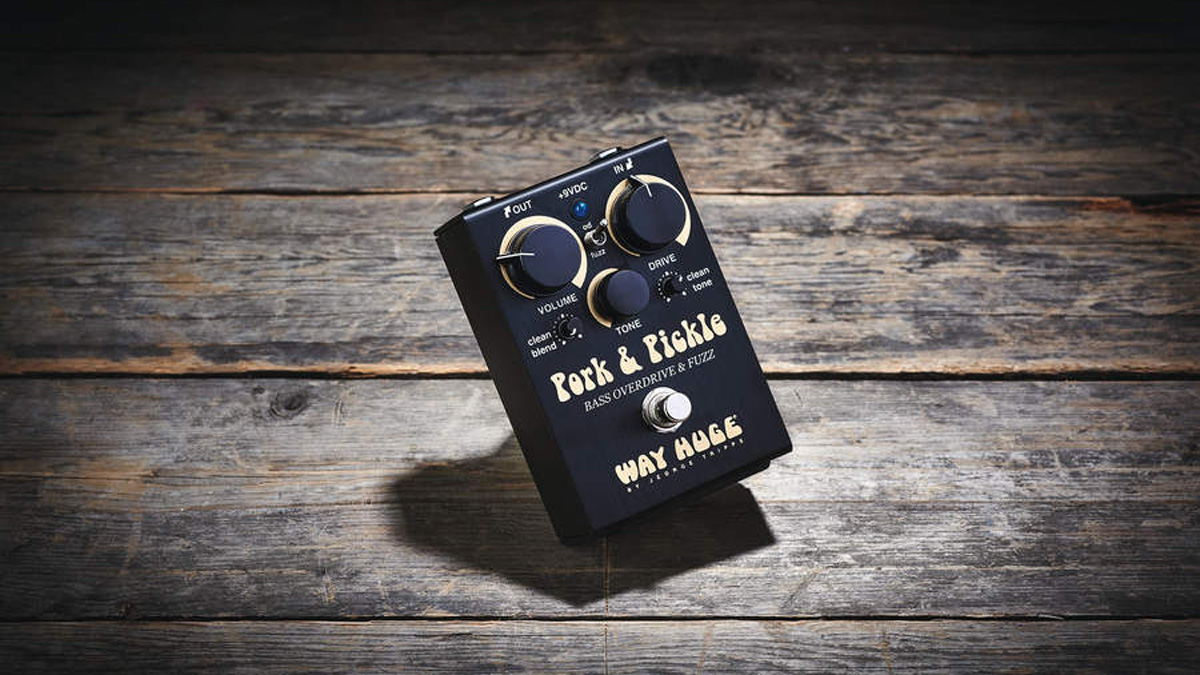MusicRadar Verdict
Bass players shouldn’t have all the fun with this tasty pedal.
Pros
- +
Choice of overdrive or fuzz in one pedal.
- +
Clean blend.
Cons
- -
The overdrive may be too dark sounding.
MusicRadar's got your back
Way Huge describes its new Pork & Pickle as its first pedal for bass, but we don’t see why bass players should nab all the fun here.
After all, this pedal offers a choice of overdrive or fuzz with the option of blending either with clean tone. Sounds like something that guitarists could make good use of...
The Pork & Pickle makes even more sense as a menu item for a guitarist’s pedalboard when you realise what it’s based on. The soft clipping overdrive of Way Huge’s Pork Loin offers grit without overly processing the sound or killing bottom end, while the company’s Russian Pickle offers Muff-style fuzz with low-end thump and a solid midrange. The Pork & Pickle, as the name suggests, puts both of those circuits into one box.
Sounds
A toggle switch lets you select either overdrive or fuzz with Drive and Tone knobs to shape the sound. The clean sound that you can mix in is not your dry guitar sound but the same sweet tone as found in the original Pork Loin, created by channelling it through a modified classic, British-style preamp.
This can be mixed with drive or fuzz via two smaller knobs, which blend in the amount of clean tone that is present in the mix and sculpt its tone. The overdrive on its own offers warm-toned, girthy drive sounds but the really choice sounds are to be had from a clean/drive blend. These can range from a clean sound with a bit of hair on it to overdrive with extra bite and articulation, evoking the feel of playing through two amps at once.
Likewise, while the fat Muff-style fuzz can stand on its own merits, those blends can give it a certain articulation that it wouldn’t have on its own. With a Volume knob that delivers plenty of extra gain to drive amps and extra tweaking courtesy of some internal trimmers, there’s plenty of tonal tasks that this can take care of.
We can see why this would appeal to bass players as it worked really well with our baritone and Fender Bass VI but standard six-stringers will find much to like here too. We urge you to try a bite of one.
Trevor Curwen has played guitar for several decades – he's also mimed it on the UK's Top of the Pops. Much of his working life, though, has been spent behind the mixing desk, during which time he has built up a solid collection of the guitars, amps and pedals needed to cover just about any studio session. He writes pedal reviews for Guitarist and has contributed to Total Guitar, MusicRadar and Future Music among others.
With its latest free update, Ableton has finally turned Note into the app I always wanted it to be
Technically capable, but struggle to make your tunes sound musical? 5 simple music theory hacks to make your tracks stand out
"Despite its size, it delivers impressive audio quality and premium functions as well as featuring a good selection of inspired sounds": Roland GO:Piano 88PX review











